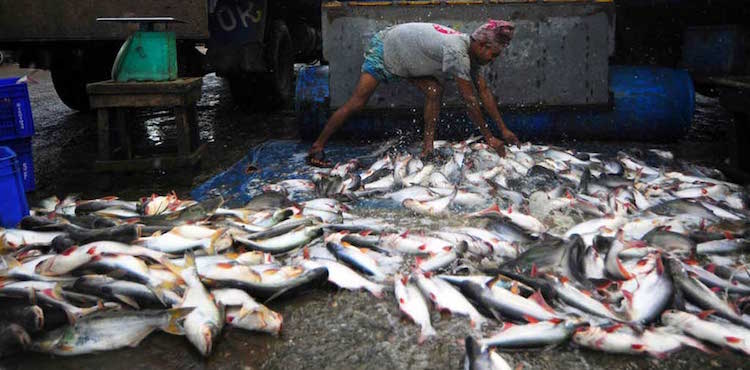ROME – The United Nations Food and Agriculture Organization (FAO) has announced that a groundbreaking international accord aimed at stamping out illegal fishing went into effect on June 5 and is now legally binding for the 29 countries and a regional organization that have adhered to it.
“This is a great day in the continuing effort to build sustainable fisheries that can help feed the world,” said FAO Director-General Jose Graziano da Silva in a press release.
The Agreement on Port State Measures to Prevent, Deter and Eliminate Illegal, Unreported and Unregulated Fishing (PSMA) – adopted as an FAO Agreement in 2009 after a years-long diplomatic effort – is the first ever binding international treaty that focuses specifically on illicit fishing. The threshold to activation of the treaty – which called for at least 25 countries to adhere to it – was surpassed last month, triggering a 30-day countdown to today’s entry-into-force.
“We hail those countries that have already signed on to the agreement and who will begin implementing it as of today. We invite governments who have yet to do so, to join the collective push to stamp out illegal fishing and safeguard the future of our ocean resources,” Graziano da Silva added.
VIENNA – World manufacturing remained sluggish in the first quarter of 2016 due to the fragile nature of the recovery process in industrialized economies, which in turn had an impact on growth rates in both developing and emerging industrial economies, according to a quarterly report by the United Nations Industrial Development Organization (UNIDO) released on June 1.
Despite weakened growth, developing and emerging industrial economies contributed 90 per cent of global manufacturing growth. World manufacturing output grew by 2.1 per cent in the first quarter of 2016, compared to the same period of the previous year. Manufacturing output growth was estimated at 0.3 per cent in industrialized economies, and 4.7 per cent in developing and industrial economies.
Most of the growth of industrialized economies came from Europe, where manufacturing output rose by 2.3 per cent. In East Asia, on the other hand, manufacturing production dropped by 2.9 per cent. Eurozone economies, backed by falling energy prices and a cheaper Euro, have shown consistent growth, with the manufacturing output of Greece, Italy and Spain rising.
With the uncertainty created by a potential Brexit, the United Kingdom experienced a decline in manufacturing output. Output also dropped in oil-dependent economies such as Norway and the Russian Federation, by 6.4 and 3.4 per cent respectively.
The manufacturing output of China, which recently emerged as the world’s largest manufacturer, rose by 7.4 per cent in the first quarter. The manufacturing output of Latin America, which has suffered from subdued global demand for commodities and falling oil prices, dropped by 3.3 per cent. One of the sharpest declines of 11.2 per cent was observed in Brazil.
Asian economies showed a higher growth performance with manufacturing output rising in Malaysia, Indonesia and Viet Nam. However, India’s manufacturing output unexpectedly plunged by 2.2 per cent after a short-lived high growth period. The manufacturing output of Africa dropped by 1.1 per cent, as the major economies suffered from low capital inflows and reduced exports.
VIENNA – The Comprehensive Nuclear-Test-Ban Treaty Organization (CTBTO) is convening its 20th anniversary ministerial meeting on June 13, 2016 at the Vienna International Centre, Austria, with: Federica Mogherini, EU High Representative for Foreign Affairs and Security Policy; Lazăr Comănescu, Foreign Minister of Romania, Chair of the CTBTO Preparatory Commission; Erlan Idrisov, Foreign Minister of Kazakhstan, Co-Chair of the CTBT entry into force process (Article XIV) 2015 – 2017; Kim Won-soo, United Nations High Representative for Disarmament Affairs; and Lassina Zerbo, CTBTO Executive Secretary.
The event will be joined by Ministers from other CTBT Member States, Member State and Annex 2 country representatives, Members of the CTBT Group of Eminent Persons, and Members of the CTBTO Youth Group.
Exhibition opening on June 13 will feature: Hands-on experience with on-site inspection equipment not made available to the public before; the 360 ̊ virtual reality film installation “Collisions”, featuring an Australian indigenous elder who experienced nuclear testing in his homelands. Filmmaker Lynette Wallworth will be present. Artworks and photography inspired by the issue of nuclear testing from China, Kazakhstan and other countries will also be on display.
The CTBT bans all nuclear explosions, thus hampering both the initial development of nuclear weapons as well as significant enhancements (h-bomb). The Treaty also helps prevent harmful radioactive releases from nuclear testing.
The CTBT has so far been signed by 183 States and ratified by 164. However, its entry-into-force provision requires 44 particular “nuclear technology holder” States to ratify the Treaty for it to enter into force. Eight of them have yet to ratify: China, the Democratic People’s Republic of Korea (DPRK), Egypt, India, Iran, Israel, Pakistan, and the United States (China, Egypt, Iran, Israel and the United States have already signed the Treaty).
A verification regime to monitor the globe for nuclear explosions is nearing completion with around 90 percent of the 337 planned International Monitoring System facilities already in operation. The system has proved its capabilities to detect even small nuclear tests during the announced DPRK nuclear tests in 2006, 2009, 2013 and 2016. (7 June 2016)
IDN is flagship agency of the International Press Syndicate.
Photo: A fisheries worker unloading the morning’s catch. Photo: UNFAO

